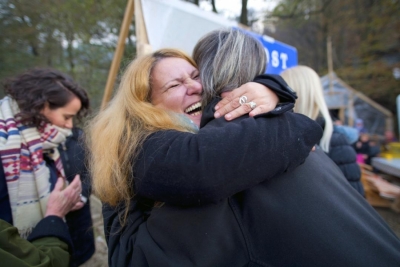How did the residents of Kruščica receive the good news?
People are extremely happy of course. They celebrate with songs and traditional dances. They are glad to see a positive shift forward and they are grateful to all civil society organizations, individuals, and media who helped them fight for their river. Even though they are aware that the case is not fully over yet, this is a huge step forward.
What does the court's verdict mean for them after many months of resistance?
It is mainly satisfactory, finally they can go home and return to their normal life after guarding the access bridge 24 hours per day in order to prevent construction.
You mentioned that the case is not closed yet. What is the current situation in Kruščica then?
All permits for both projects are now cancelled. But investors may file an appeal against the verdict and they can apply for new permits. However, this time they would be required to be transparent throughout the process, meaning they would have to comunicate with all interested parties, with the local community, and involve them in the process from the beginning.
So Kruščica river is not safe from hydropower construstion for now?
Not yet, I think that it will be soon. Along with stopping the current projects, this will be a strong message to other investors to bear in mind that they are not welcome there.
What can we expect in Kruščica? What will be the latest development?
We will be on the lookout, as we wait for the final outcome of the civil proceedings related to concessions. We hope it will be in our favor and that concessions will be cancelled for good.
How did the lives of locals change, apart from the blockade itself?
Kruscica residents are now more interested in public affairs. They realized that they have rights and possibilities in terms of infrastructure development to improve their quality of life. Their dream is to revive the touristic potential of the area to the way it was in the former Republic (Yugoslavia). The local community board is very active, as well as the local environmental association “Bistro,” which was established last year during the protests.
Kruščica is not the first to succeed, but similar happy endings to such cases in Bosnia and Herzegovina are very rare. How important is it for other similar disputes? Might it be some kind of precedent, or promotion of environmental activism?
The story of Kruščica has been covered by media significantly. Surely, it will encourage other activists to stand up for their rivers and to see that change is possible. It is important to be united, brave, and persistent, and to be able to recognize and overcome different obstacles. This case is already motivating other groups and sometimes Kruščica people support these groups in protests and advisory issues.

Jelena Ivanić was born in 1987 in Novi Grad.
She studied ecology and environmental protection at the University of Banja Luka.
She has been volunteering for a long time, organizing awareness seminars
and youth education on environmental issues.
In the Center for the Environment, she focuses with energy and climate change.


